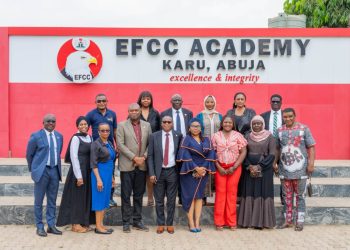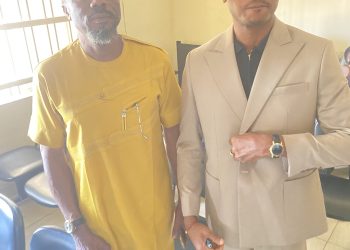By Nkechi Eze
The Executive Chairman of the Economic and Financial Crimes Commission (EFCC), Mr. Ola Olukoyede, has called for enhanced collaboration between the Commission and relevant stakeholders in the fight against economic and financial crimes, particularly money laundering, terrorist financing, and counter-proliferation financing.
Dele Oyewale the commission’s spokesperson in an official signed statement disclosed that the call was made during a one-day sensitization and engagement workshop on Anti-Money Laundering, Combating the Financing of Terrorism, and Counter Proliferation Financing (AML/CFT/CPF), held in Benin City on Tuesday, June 3, 2025. The event was organized by the Special Control Unit Against Money Laundering (SCUML), an arm of the EFCC.
Speaking through the Acting Director of the Benin Zonal Directorate, Assistant Commander of the EFCC (ACE I) Effa Okim, the EFCC Chairman emphasized that strategic cooperation with stakeholders was crucial to the successful execution of the Commission’s mandate. He urged all participants, especially Designated Non-Financial Businesses and Professions (DNFBPs), to ensure strict compliance with all anti-money laundering laws and regulations.
“Collaboration remains one of our core values, and it is key to achieving our mandate,” Olukoyede stated. “The relevance of ensuring compliance with anti-money laundering laws and regulations by all concerned cannot be overemphasized. We enjoin our stakeholders to ensure compliance of their members with the extant laws. This will guarantee the realisation of our objective to exit the FATF grey list.”
In a presentation titled “Predicate Offences Identification and Reporting,” Superintendent of the EFCC, Chika Uneke, outlined various predicate offences under the Money Laundering (Prevention and Prohibition) Act, 2022. These included participation in organized crime, racketeering, terrorism, terrorist financing, drug trafficking, corruption, bribery, fraud, currency counterfeiting, extortion, forgery, and piracy.
Uneke stressed that DNFBPs are legally required to report any suspicious financial activity or predicate offences linked to their clients to SCUML or the Nigerian Financial Intelligence Unit (NFIU). He explained that early reporting plays a critical role in the EFCC’s preventive efforts and helps disrupt criminal financial flows.
Also speaking at the workshop, Head of SCUML in the Benin Zonal Directorate, Ibrahim Boyi, delivered a presentation on “Roles and Responsibilities of Self-Regulatory Organisations, Trade Associations, and Trade Unions (SRO/TA/TU).” He explained that such bodies are obligated to monitor their members for compliance with AML/CFT/CPF regulations, enforce appropriate sanctions for non-compliance, and institute internal control systems including training and sensitization programmes.
“SCUML is mandated by law to register, monitor, and supervise DNFBPs in relation to AML/CFT/CPF compliance. New businesses and professions must register with SCUML before commencing operations,” Boyi stated.
He further advised business entities to adhere strictly to Know-Your-Customer (KYC) and Customer Due Diligence (CDD) requirements. According to him, businesses are expected to obtain standard KYC data from customers, including full name, address, phone number, email address, and valid means of identification, all of which must be verified for accuracy.
Boyi also reiterated the obligation for DNFBPs to report cash transactions above ₦5 million for individuals and ₦10 million for corporate bodies to SCUML within seven days. In the absence of such transactions, he noted, DNFBPs are required to file monthly nil reports.
“The law is that you report. So even when it is nil, you report to SCUML that it is nil,” he emphasized.
He cautioned SROs, trade unions, and associations to conduct background checks on their members, warning that failure to do so may result in their platforms being exploited by criminal elements.
Participants at the workshop included automobile dealers, real estate agents, student union leaders, and representatives from the National Orientation Agency (NOA), all of whom were urged to take their regulatory obligations seriously in the national effort to stem the tide of financial crimes.
The workshop underscored the EFCC’s determination to ensure broader awareness and compliance with anti-money laundering standards, while reinforcing the importance of partnership between the Commission and key actors in Nigeria’s financial and business sectors.













